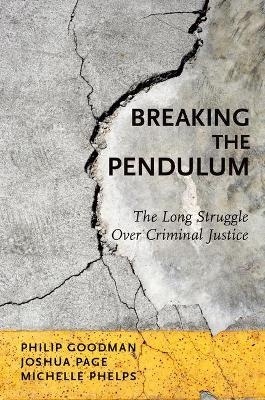
Breaking the Pendulum
The Long Struggle Over Criminal Justice
Seiten
2017
Oxford University Press Inc (Verlag)
978-0-19-997606-5 (ISBN)
Oxford University Press Inc (Verlag)
978-0-19-997606-5 (ISBN)
In Breaking the Pendulum, Philip Goodman, Joshua Page, and Michelle Phelps debunk the pendulum model of American criminal justice, arguing that it distorts how and why punishment changes. From the birth of the penitentiary through recent reforms, the authors show how the struggle of players in the penal field shapes punishment.
The history of criminal justice in the U.S. is often described as a pendulum, swinging back and forth between strict punishment and lenient rehabilitation. While this view is common wisdom, it is wrong. In Breaking the Pendulum, Philip Goodman, Joshua Page, and Michelle Phelps systematically debunk the pendulum perspective, showing that it distorts how and why criminal justice changes. The pendulum model blinds us to the blending of penal orientations, policies, and practices, as well as the struggle between actors that shapes laws, institutions, and how we think about crime, punishment, and related issues.
Through a re-analysis of more than two hundred years of penal history, starting with the rise of penitentiaries in the 19th Century and ending with ongoing efforts to roll back mass incarceration, the authors offer an alternative approach to conceptualizing penal development. Their agonistic perspective posits that struggle is the motor force of criminal justice history. Punishment expands, contracts, and morphs because of contestation between real people in real contexts, not a mechanical "swing" of the pendulum. This alternative framework is far more accurate and empowering than metaphors that ignore or downplay the importance of struggle in shaping criminal justice.
This clearly written, engaging book is an invaluable resource for teachers, students, and scholars seeking to understand the past, present, and future of American criminal justice. By demonstrating the central role of struggle in generating major transformations, Breaking the Pendulum encourages combatants to keep fighting to change the system.
The history of criminal justice in the U.S. is often described as a pendulum, swinging back and forth between strict punishment and lenient rehabilitation. While this view is common wisdom, it is wrong. In Breaking the Pendulum, Philip Goodman, Joshua Page, and Michelle Phelps systematically debunk the pendulum perspective, showing that it distorts how and why criminal justice changes. The pendulum model blinds us to the blending of penal orientations, policies, and practices, as well as the struggle between actors that shapes laws, institutions, and how we think about crime, punishment, and related issues.
Through a re-analysis of more than two hundred years of penal history, starting with the rise of penitentiaries in the 19th Century and ending with ongoing efforts to roll back mass incarceration, the authors offer an alternative approach to conceptualizing penal development. Their agonistic perspective posits that struggle is the motor force of criminal justice history. Punishment expands, contracts, and morphs because of contestation between real people in real contexts, not a mechanical "swing" of the pendulum. This alternative framework is far more accurate and empowering than metaphors that ignore or downplay the importance of struggle in shaping criminal justice.
This clearly written, engaging book is an invaluable resource for teachers, students, and scholars seeking to understand the past, present, and future of American criminal justice. By demonstrating the central role of struggle in generating major transformations, Breaking the Pendulum encourages combatants to keep fighting to change the system.
Philip Goodman is Assistant Professor of Sociology, University of Toronto Mississauga Joshup Page is Associate Professor of Sociology, University of Minnesota Michelle Phelps is Assistant Professor of Sociology, University of Minnesota
Preface
Chapter 1: Penal Development and Plate Tectonics
Chapter 2: The Pain of Penitence: Battling over Criminal Justice in Early America
Chapter 3: Reform and Repression in the Progressive Era
Chapter 4: Rehabilitation-All Things to All People
Chapter 5: Deconstructing the Carceral State
Chapter 6: Beyond the Pendulum
Appendix
Notes
References
Index
| Erscheinungsdatum | 21.04.2017 |
|---|---|
| Verlagsort | New York |
| Sprache | englisch |
| Maße | 156 x 234 mm |
| Gewicht | 363 g |
| Themenwelt | Recht / Steuern ► EU / Internationales Recht |
| Recht / Steuern ► Strafrecht ► Kriminologie | |
| Recht / Steuern ► Strafrecht ► Strafverfahrensrecht | |
| ISBN-10 | 0-19-997606-6 / 0199976066 |
| ISBN-13 | 978-0-19-997606-5 / 9780199976065 |
| Zustand | Neuware |
| Haben Sie eine Frage zum Produkt? |
Mehr entdecken
aus dem Bereich
aus dem Bereich


